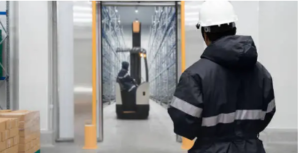Industrial Refrigeration Melbourne: Navigating Efficiency and Sustainability in the Cold Chain
Industrial refrigeration, including walk in coolers industrial refrigeration Melbourne, stands at the heart of diverse sectors, providing a critical infrastructure for preserving and transporting temperature-sensitive products. Walk-in coolers, with their expansive storage capacity and temperature control features, are particularly vital in industries ranging from food and pharmaceuticals to chemicals and beyond. From small-scale businesses to large industrial facilities, these walk-in coolers contribute significantly to maintaining the integrity of perishable goods.
 From food and pharmaceuticals to chemicals and beyond, the need for efficient and sustainable refrigeration solutions has never been more significant. In this article, we delve into the multifaceted world of industrial refrigeration, exploring its importance, technological advancements, and emerging trends that shape the landscape of this essential industry.
From food and pharmaceuticals to chemicals and beyond, the need for efficient and sustainable refrigeration solutions has never been more significant. In this article, we delve into the multifaceted world of industrial refrigeration, exploring its importance, technological advancements, and emerging trends that shape the landscape of this essential industry.
The Significance of Industrial Refrigeration:
Preserving Perishables:
At its core, industrial refrigeration is about safeguarding perishable goods. The ability to maintain specific temperature conditions throughout the supply chain ensures that products retain their quality and safety from production to consumption. It is particularly crucial in sectors such as agriculture, pharmaceuticals, and biotechnology, where the integrity of products relies heavily on controlled temperatures.
Supply Chain Optimization:
Industrial refrigeration plays a pivotal role in optimizing supply chains. By preventing spoilage and extending the shelf life of products, it allows for more efficient production, storage, and distribution processes. In turn, it reduces waste, enhances product availability, and contributes to overall supply chain resilience.
Technological Advancements in Industrial Refrigeration:
Smart Refrigeration Systems:
. Automated monitoring systems equipped with sensors enable real-time data collection and analysis, ensuring precise control over temperature and humidity levels. It not only enhances product safety but also facilitates predictive maintenance, reducing downtime and operational costs.
Energy-Efficient Solutions:
The quest for sustainability has spurred the development of energy-efficient refrigeration solutions. Advanced compressor technologies, including variable-speed compressors and magnetic bearing compressors, optimize energy consumption by adjusting cooling capacity based on actual requirements. It not only lowers operational costs but also aligns with global efforts to reduce energy consumption and mitigate environmental impact.
Natural Refrigerants:
The industry is witnessing a shift towards natural refrigerants, driven by environmental concerns and regulatory changes. Ammonia, carbon dioxide (CO2), and hydrocarbons are gaining popularity as alternatives to traditional synthetic refrigerants due to their lower environmental impact. This transition aligns with global initiatives aimed at phasing out ozone-depleting substances and reducing greenhouse gas emissions.
Heat Recovery Systems:
Industrial refrigeration systems often generate excess heat during the cooling process. Heat recovery systems capture and repurpose this excess heat for other applications, such as space heating or water heating. It not only improves overall energy efficiency but also promotes a more sustainable and integrated approach to industrial processes.
Current Trends in Industrial Refrigeration:
Digitalization of Cold Storage:
The rise of e-commerce and the increasing demand for efficient cold storage solutions have led to the digitalization of cold storage facilities. Automation, robotics, and artificial intelligence are being employed to optimize inventory management, reduce human errors, and enhance overall operational efficiency.
Decentralized Refrigeration Systems:
A notable trend is the adoption of decentralized refrigeration systems. Instead of relying on a centralized unit, multiple smaller refrigeration units are strategically placed throughout a facility. This approach not only enhances flexibility and scalability but also ensures targeted and efficient cooling in specific areas, reducing energy consumption.
Data-Driven Predictive Maintenance:
Data analytics and predictive maintenance are becoming integral to industrial refrigeration. By leveraging historical data and real-time analytics, companies can predict potential equipment failures and schedule maintenance activities proactively. It minimizes downtime, extends the lifespan of equipment, and improves overall system reliability.
Eco-Friendly Cold Chain Initiatives:
Companies are increasingly embracing eco-friendly cold chain initiatives. It includes not only the adoption of natural refrigerants but also the implementation of sustainable practices throughout the supply chain.
Industrial refrigeration, such as walk in coolers industrial refrigeration Melbourne, is an indispensable component of modern supply chains, ensuring the safe and efficient transportation of temperature-sensitive products. As the industry evolves, technological advancements and emerging trends are shaping a future where efficiency and sustainability go hand in hand. From smart refrigeration systems to decentralized approaches and eco-friendly initiatives, the industrial refrigeration sector, including walk-in coolers, is at the forefront of innovation, adapting to meet the demands of a dynamic and ever-changing global market.
Comments are Disabled